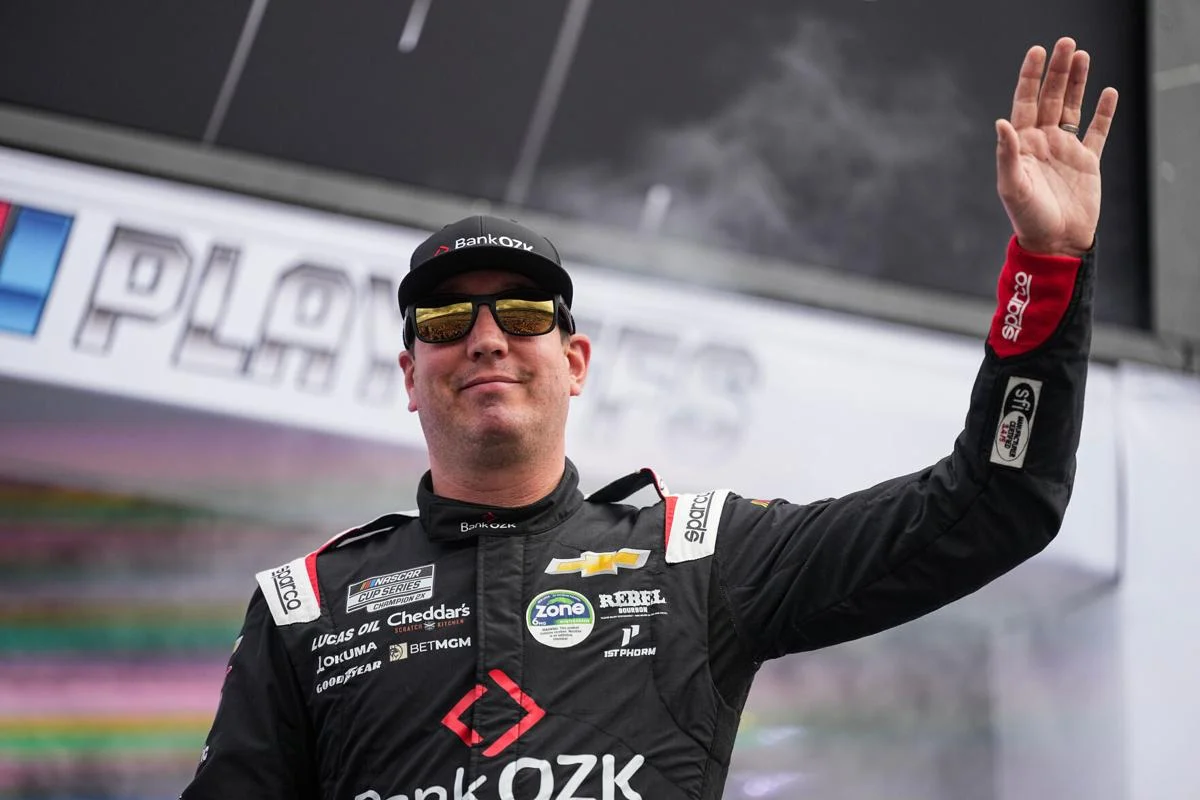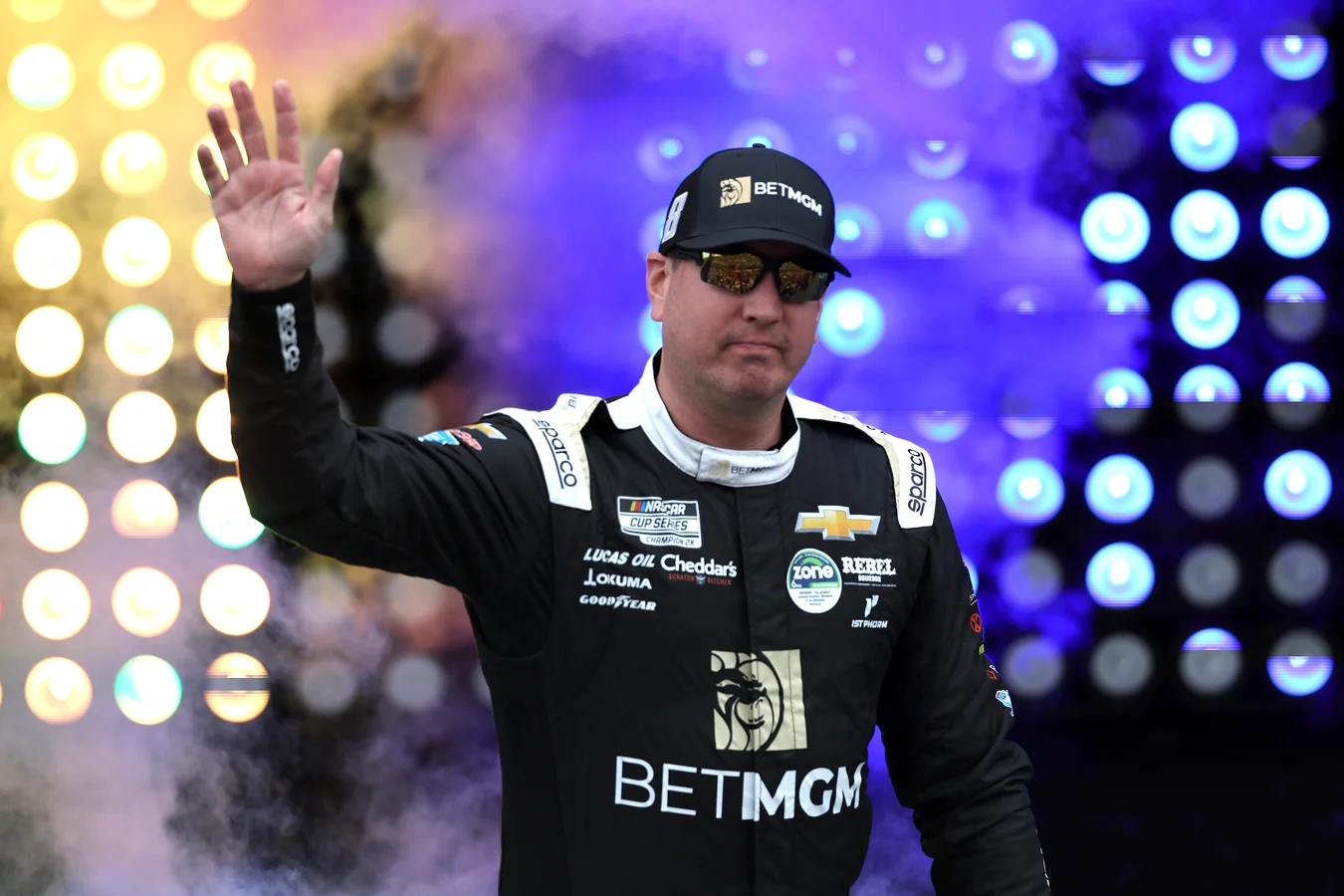Kyle Busch is once again at the center of a heated discussion following renewed criticism of his 2015 title run, highlighting the ongoing Kyle Busch championship controversy. The debate resurfaced after former driver Landon Huffman took to social media to question the legitimacy of Busch’s championship, sparking a strong and unmistakable response from the driver as NASCAR fans and analysts revisit playoff rules and driver legacies.
Renewed Criticism Ignites Old Debates
Kyle Busch has maintained a reputation for his aggressive driving and outspoken personality, traits that often put him under the spotlight in the NASCAR community. As he prepared with Richard Childress Racing for the Xfinity 500 at Martinsville Speedway, a new controversy emerged, one that links back to a significant moment in his career.
The controversy began when Landon Huffman, a former NASCAR Truck Series driver, posted a pointed message on X (formerly Twitter) that referenced the unusual path that led Busch to the 2015 NASCAR Cup Series championship. Huffman’s message resonated widely, as he questioned the system that allowed a champion who missed nearly a third of the season’s races to still claim the sport’s highest honor.
“I never forget that this is the same format that crowned a NASCAR Cup Series champion who missed 11 of the 36 races in the season. As crazy as tonight’s outcome is, that 2015 season tops it for me in the ‘what are we doing’ department.” – Landon Huffman, Former NASCAR Truck driver
This comment did not go unnoticed by Busch, who reacted quickly and candidly. Known for defending his legacy and accomplishments, Busch responded with middle-finger emojis on the platform, making it clear that the remark stung and that questions about his 2015 championship continue to hit a nerve years after the fact.

In recent memory, Busch’s confrontational exchanges online and with media have become nearly as notable as his achievements on track. The latest dispute with Huffman is one in a series of clashes that includes memorable on-track incidents with stars like Kevin Harvick, Joey Logano, and Brad Keselowski. These moments have only cemented his place as one of NASCAR’s most polarizing figures, ensuring that his every move, both positive and controversial, is dissected in real time.
The 2015 Championship Revisited
Busch’s 2015 championship has remained a contentious subject within the NASCAR community. That season, he missed 11 of the scheduled 36 races after suffering a severe injury. NASCAR granted him a medical waiver that allowed him to compete in the playoffs—provided he achieved a win in one of the remaining points races and ranked within the top 30 in the standings by the cutoff.
This use of the medical waiver, although within the rules, has drawn sustained criticism from fans, analysts, and former drivers. Some believe the rule undermines the value of consistent season-long performance, while others view it as a necessary accommodation for drivers recovering from unavoidable setbacks.
The decision at that time had public backing from NASCAR leadership. Former CEO and Chairman Brian France remarked,
“What happened to him was on us.” – Brian France, Former NASCAR CEO and Chairman
In addition, Steve O’Donnell, Executive Vice President of NASCAR, justified the waiver approach, explaining,
“The spirit of the rule never was designed to punish drivers who are unable to compete due to extenuating circumstances such as recovering from a racing accident.” – Steve O’Donnell, NASCAR Executive VP
Despite these endorsements from NASCAR’s highest officials, the format and rule application remain divisive. Critics argue that the circumstances surrounding Busch’s championship undermine its legacy, while his supporters contend that he operated entirely within the published rules.
Playoff System Under Ongoing Scrutiny
The current playoff format itself has continued to inspire debate regarding how a champion should be determined in the NASCAR Cup Series. Some argue that the system places too much emphasis on winning at the right moments as opposed to recognizing season-long consistency, which adds randomness to crowning a champion.
Kyle Busch, who has never hesitated to take on the system, has made his stance clear in recent years. He often points out that the responsibility to adjust belongs equally to all drivers, given that everyone starts the season knowing the rules they must play by. He echoed this philosophy with a pragmatic view:
“If you know what it is going in, exploit it … figure out your best way through the system.” – Kyle Busch, NASCAR driver
For Busch, the discussion is not so much about the format itself but how competitors can maximize their results within the established framework. Still, the lingering doubts about certain championships, particularly his 2015 triumph, continue to shape discussion around the legitimacy of NASCAR titles and, by extension, drivers’ legacies.
The Impact on Busch’s Career and Mindset
The recurrence of this issue and the intensity of reactions from fans, media, and peers underscore the lasting significance of how championships are decided in NASCAR. The legitimacy of championships not only impacts how fans perceive drivers, but also influences debates among analysts, sponsors, and organizations tied to the sport. The “Kyle Busch championship controversy” serves as a perennial example of how racing outcomes can be shaped by both results on track and policies off it.
The 2025 season has proven difficult for Busch, possibly his most challenging yet. With no wins and his lowest points standing to date, the driver is already looking beyond the current campaign toward rebuilding and refocusing. The criticism has become a factor in shaping his strategy and mindset as he eyes a stronger future performance.
Beyond the statistics, Busch’s continued engagement in these debates demonstrates his commitment to defending his record and reputation. His responses, whether online or in the media center, highlight his intense drive and unwillingness to let controversial opinions go unchecked.
A Fresh Start with a New Team Dynamic
As Busch heads into the offseason, changes among his team signal a possible shift in approach for 2026. He and his crew will be working to get in sync with Jim Pohlmann, who takes over as crew chief, replacing Randall Burnett. Pohlmann arrives from JR Motorsports, bringing experience from guiding Justin Allgaier’s recent Xfinity Series title run.
Busch addressed what the upcoming transition will mean for the group:
“I think this offseason will be different just based on trying to build some camaraderie and some time with Jim.” – Kyle Busch, NASCAR driver
He emphasized the importance of mutual understanding with his crew chief:
“Being able to spend some time with him and just kind of figure things out, what makes him tick, and obviously what makes me tick, and sort of getting on the same page to start our season,” – Kyle Busch, NASCAR driver
Busch’s approach reflects the reality of today’s NASCAR, where limited practice time means off-track chemistry is more vital than ever. He reflected on the necessity of collaboration saying,
“You know, those are always the best ways of being the most successful with a crew chief when you know what each other’s thinking and can sort of anticipate what’s next,” – Kyle Busch, NASCAR driver
For Jim Pohlmann, stepping into the top-level Cup Series team is a significant opportunity. He shared his perspective as he transitions to the new role:
“The goal for me has always been to race on Sunday and make it to that level and have an opportunity to win Daytona 500s and win at the highest level. It’s a great opportunity, and I’m certainly looking forward to it,” – Jim Pohlmann, Crew Chief
The coming months will see Busch and Pohlmann working closely to rebuild trust, develop strategic cohesion, and set themselves up for a better campaign. The crew’s ability to adapt and form a powerful partnership could very well shape the narrative of the next season.
What Lies Ahead for Busch and NASCAR
Now at age 40, Busch remains one of the sport’s most vigorously discussed drivers, both for his accomplishments and for the enduring debates that swirl around his titles. As the “Kyle Busch championship controversy” returns to the forefront, the NASCAR community reflects on what it means to be a champion and how evolving policies affect the legacies of top competitors.
While the criticism about Busch’s 2015 championship may never fully disappear, especially in an era of social media and instant opinion sharing, Busch’s career is far from finished. He enters the offseason focused on growth, adapting to new team dynamics with Jim Pohlmann as crew chief, and determined to prove that his drive remains undiminished. As always, the saga of Kyle Busch stands as a mirror for broader questions within NASCAR—about fairness, competition, and what truly defines a champion.
Busch’s story continues to engage a passionate NASCAR audience, analysts, and fellow drivers—ensuring that every win, loss, or moment of controversy in the Cup Series will keep the dialogue about sport, legacy, and what it takes to succeed in one of America’s most demanding motorsports, alive and intense.
🖕🏻🖕🏻
— Kyle Busch (@KyleBusch) November 2, 2025
I never forget that this is the same format that crowned a NASCAR cup series champion who missed 11 of the 36 races in the season.
As crazy as tonight’s outcome is, that 2015 season tops it for me in the “what are we doing” department
— Landon Huffman (@LandonHuffman) November 2, 2025
